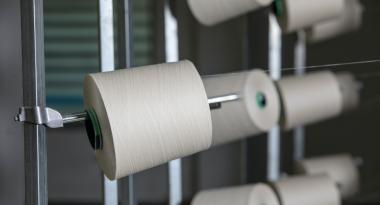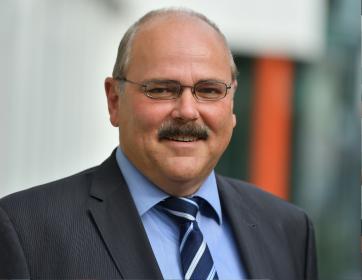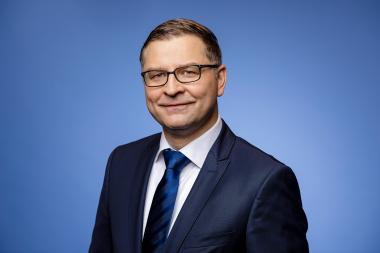The man-made fibers industry at the turning point of time
"You don't tear down a house before the new one is ready for occupancy."
Textination talked to the Managing Director of the Industrievereinigung Chemiefaser e.V., Dr. Wilhelm Rauch, about his assessment of the turning point that the man-made fibers industry is currently facing. What are the risks and threats, and what needs to change in order to remain a competitive player on the global market.
US President Joe Biden has called his Russian counterpart Vladimir Putin a war criminal in connection with the invasion of Ukraine. The United Nations' highest court, the International Court of Justice in The Hague, has ordered Russia to immediately end its war against Ukraine. How do you personally assess Russia's behavior?
Dr. Rauch: With family roots in the Rhineland, Central and East Germany, I grew up at a time when, as a result of the division of Europe, families were separated and people were ruthlessly shot in the middle of Germany who wanted to cross the inner-German demarcation line towards the West. Since 1989, the fall of the Iron Curtain has led us into a period that lasted more than 30 years and allowed us, at least in Europe, to experience an era of peaceful coexistence between the great power blocs, intensive trade relations and prosperous states.
It is more than shocking to see today how Russia is trying to turn back the wheel of history in Europe with a brutality that the youngest generation growing up in Europe has fortunately not had to experience so far, and it brings back the worst memories of the Cold War, which everyone hoped would never return. If today in Ukraine even facilities for the peaceful use of nuclear energy are fired upon, a dimension has been reached that one does not want to extrapolate any further. In addition to the unspeakable human suffering caused, which we can only begin to alleviate by accepting Ukrainian refugees, in the long term all trust in political promises is being gambled away, which, however, is essential both for peaceful coexistence and for economic cooperation. We are facing a reordering of the world in which supply relationships and dependencies with or on autocratic states must be evaluated much more sensitively for each individual case.
The economic consequences of the Russia-Ukraine conflict are becoming increasingly clear. The Association of German Chambers of Commerce and Industry (DIHK) is correcting its forecast for 2022, but does not yet see a recession. What are your expectations for the industry in the current fiscal year?
Dr. Rauch: The man-made fibers industry has been severely affected by the SARS-CoV-2 pandemic in the last two years. Planned investments were first postponed and then finally abandoned. By the end of 2022, three man-made fibers producers will close their doors in Germany compared to 2019. The industry started the current year on a very hopeful note, although previous issues such as REACH and, above all, energy costs were already increasing in severity before the Russia-Ukraine war. The economic consequences of the war will have a negative impact both directly in the form of increased energy prices and indirectly through changes in international competitive conditions.
What do the war in Ukraine and the economic sanctions against Russia entail for the upstream supply chains of the manmade fiber industry?
Dr. Rauch: The immediate upstream supply chains will not be affected much by this war at first. However, we must expect supply chains in other industries to be disrupted. If, for example, certain raw materials or products are no longer available, this can have a noticeable impact, starting with logistics (mobility) and extending to components in production technology facilities. An example of this is the availability of cable harnesses, which were previously produced in Ukraine and are indispensable in many electronic components for man-made fibers production.
What is the relevance of Ukraine and Russia as sales markets for IVC member companies?
Dr. Rauch: If we take the last year before the outbreak of the SARS-CoV-2 pandemic as the reference year, exports to Ukraine and the Russian Federation account for around 1.6% of total exports of man-made fibers from Germany. On average, a loss of sales to these countries can be tolerated, although it should not be forgotten that in individual cases - depending on a company's product portfolio - the impact can be quite significant. Looking beyond the horizon, it is not only the direct exports of man-made fibers to the war region that are of significance, but also deliveries of products in which man-made fibers are processed. Here, there are now interrupted supply relationships that result in order losses for the man-made fibers industry.
Certain industries are particularly affected by the consequences - what does this mean for the man-made fibers sector as a supplier industry?
Dr. Rauch: Wherever production is cut back along the downstream value chain in which man-made fibers were used, the effects will be noticeable with a temporal delay. This applies, for example, to deliveries to the automotive sector, where the production of new vehicles comes to a standstill due to a lack of components originating from Ukraine.
How are exploding energy prices and the gas embargo affecting man-made fibers producers in the DACH region?
Dr. Rauch: Even before the Russia-Ukraine war, European energy costs were already at a level that hit our members hard. For example, European gas costs currently rose by ten times from approx. 12 EUR/MWh to approx. 120 EUR/MWh as a result of the war, while in the USA they "only" rose by two and a half times from approx. 8 EUR/MWh to approx. 18 EUR/MWh. The situation is similar for electricity prices in Germany in particular, which have also risen by a factor of 10 from an already high level. Further price increases in Europe cannot be ruled out, but are more likely. Against this background, moderate adjustments in man-made fibers prices are only a drop in the bucket. A market development with virtually exploding energy costs cannot be reliably depicted by any company, nor can it be priced in such a way as to cover costs.
As the industry association of the man-made fibers industry, what do you think of "Freeze for Peace" or a stop to all Russian gas and raw material imports?
Dr. Rauch: In Germany in particular, we have deliberately made ourselves dependent on Russian gas, contrary to all international warnings, by defining it as necessary for the bridge technology of electricity generation that we will need after the shutdown of coal- and nuclear-based power plants, before the availability of a sufficient amount of so-called "green" energy is assured. Gas is also needed for heating purposes and as a raw material, so it takes on the function of an all-rounder.
A boycott-related import stop would not only have serious negative consequences for the man-made fibers sector, but for the entire German industry and the majority of private households. As I mentioned at the beginning, it is the order of the day to help alleviate human suffering by taking in Ukrainian refugees. But this is not the end of the crisis. It must be assumed that the war situation will not be resolved in the near future. However, in order to cope with a protracted crisis situation, our economic strength must be maintained in order to be able to cope with the challenges ahead. An import freeze would be counterproductive in this respect. Since, due to the latest developments, gas deliveries are now to be paid for in rubles, there is rather a risk that Russia, for its part, will stop gas deliveries. In their effect, the two scenarios do not differ. The only thing that is certain is the fact that the availability of Russian gas to Europe is no longer guaranteed. Ultimately, the Russian demand to switch payments to rubles, which is not only aimed at revaluing the ruble, makes it clear that Russia is not dependent on Europe as a buyer of its gas. This would mean that a "freeze for peace" would lead to nothing. In the Far East, there is already a potential buyer of Russian gas to obtain it cheaply and safely, and which is also a major competitor of the European chemical fiber industry: China.
Are agreements with the United Arab Emirates and Qatar a good substitute solution for gas and oil supplies from Russia?
Dr. Rauch: It is not a question of evaluating a measure in the sense of good or bad, but of whether it appears suitable in this particular situation to reduce unilateral dependencies on an aggressor before sustainable solutions are available in sufficient quantity. In this respect, there should initially be no ideological barriers in the measures to be examined for feasibility. The agreements concluded with the United Arab Emirates and Qatar after certainly careful political scrutiny are individual decisions and represent only one piece in the mosaic among many.
Does the saying "First we had bad luck, then we were not lucky at all" apply to the current economic performance of the industry - or: how do you assess the influence of the Corona pandemic and the war situation in this respect?
Dr. Rauch: Both the SARS-CoV-2 pandemic and the Russia-Ukraine war are events with a global character. While the first event affected all countries equally sooner or later, the impact of the Russia-Ukraine war must be assessed in a more differentiated manner. The consequences of the war primarily affect companies in Europe, and there in particular those countries which - as mentioned above - have placed themselves in unilateral dependencies like Germany. This does not apply to the man-made fibers industry in particular. Although there are many fellow sufferers in other industries, this does not improve the situation, of course.
What does the industry expect from the political leaders in Berlin and Brussels in the future?
Dr. Rauch: The wish list can be fixed to a few core elements:
In the long term, we need a supply of energy and raw materials that is not based on the dependence of a few autocratic states. On the way there, against the backdrop of the Russia-Ukraine war, previous exit scenarios from coal and nuclear energy must be reconsidered without prejudice with regard to their timeline. Or to put it more concisely: You don't tear down a house before the new one is ready for occupancy.
But energies from renewable raw materials must also be offered at prices that allow global competitiveness. According to a study by DECHEMA and FutureCamp, the chemical industry has calculated a price of 4 ct/kWh (including all taxes and fees). We are miles away from this today.
The revision of REACH must not lead to further bureaucracy and requirements that tie up capacity in companies. What we need in Europe is not dotting the i on Maslow's hierarchy of needs, but to ensure that we do not slide down the levels step by step and that the i dot floats in the air without an "i".
European economic policy must focus on the international competitiveness of European industry. It is not sufficient to consider and regulate the European Union only from the point of view of the internal market. The planned carbon border mechanism is such an example. It is intended to impose customs duties on imports that carry a high CO2 burden. This may protect the domestic market, but it does nothing at all to help export-oriented European industry such as the man-made fibers sector on the international world market, because European production costs remain too high by global standards despite the carbon border taxes.
The European Commission must increasingly recognize the European industry and with it the man-made fibers industry as problem solvers. Man-made fibers are indispensable as products for the energy turnaround (rotor blades for wind turbines), lightweight construction in mobility (lightweight car bodies in composite systems), sustainable road construction (geotextiles to reinforce the road surface and increase its service life), reduction of steel-reinforced concrete and thus cement, sand and gravel (reinforcement with high-tensile man-made fibers) and medical products (medical masks, bandaging materials, stents).
In Europe, we again need more market economy and no small-scale regulations that are adapted again and again and proliferate into an impenetrable thicket.
With all the wishes to politicians mentioned above, let me finally mention the following with regard to the current situation: In 1961, after the Berlin Wall was built, Russian and American tanks faced each other at Checkpoint Charlie at a distance of less than 50 meters, ready to fire.
A year later, in October 1962, nuclear-equipped American and Russian naval units met head-on in the Cuban Missile Crisis. Both John F. Kennedy and Nikita S. Khrushchev - bitter rivals in the contest of political systems - were sensible enough at the time not to let the situation escalate.
At present, I wish our national, European and transatlantic politicians’ unconditional determination in the defense of our free democratic values, but I also appeal to all politicians worldwide to take to heart one of Albert Einstein's fundamental perceptions: "I don't know what weapons will be used in the Third World War. But I can tell you what they'll use in the Fourth - rocks!"
Textination
The Interview was conducted by Ines Chucholowius, CEO Textination GmbH





